
Palazzo Re Enzo is a palace located on Piazza del Nettuno, 1 in the historic center of Bologna, northern Italy. The palace takes its name from Enzio of Sardinia, Frederick II's son, who was prisoner here from 1249 until his death in 1272. The palace is presently used to sponsor cultural events and exhibitions.
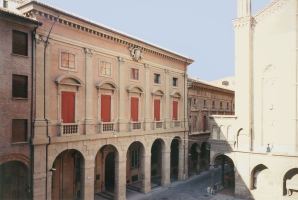
Palazzo Magnani is a Renaissance palace located on Via Zamboni number 20 in central Bologna, region of Emilia Romagna, Italy, built by the Magnani noble family with the same name.

The National Art Gallery of Bologna is a museum in Bologna, Italy. It is located in the former Saint Ignatius Jesuit novitiate of the city's University district, and inside the same building that houses the Academy of Fine Arts. The museum offers a wide collection of Emilian paintings from the 13th to the 18th century and other fundamental works by artists who were in some way related to the city.

The Carracci were a Bolognese family of artists that played an instrumental role in bringing forth the Baroque style in painting. Brothers Annibale (1560–1609) and Agostino (1557–1602) along with their cousin Ludovico (1555–1619) worked collaboratively. The Carracci family left their legacy in art theory by starting a school for artists in 1582. The school was called the Accademia degli Incamminati, and its main focus was to oppose and challenge Mannerist artistic practices and principles in order to create a renewed art of naturalism and expressive persuasion.
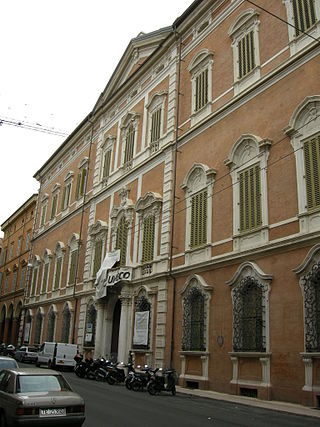
The Palazzo Aldovrandi is a Senatorial palace on Via Galliera 8 in Bologna, built in Rococo style.

Filippo Pedrini was an Italian painter.
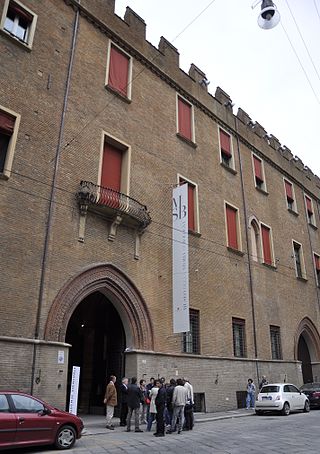
The Palazzo Pepoli Vecchio is a Medieval palace located on Via Castiglione number 8, in central Bologna, region of Emilia-Romagna, Italy. The merlonated brick Gothic-style building is now the civic Museum of the History of Bologna. It stands across the street from the Baroque-style Palazzo Pepoli Campogrande, now a civic art gallery.

The Palazzo Pepoli Campogrande, also known as Palazzo Pepoli Nuovo, is a Baroque style palace on Via Castiglione 7 in central Bologna, region of Emilia-Romagna, Italy. In 2015, it served as a public art gallery for late-Baroque art. Across the Via, rises the medieval Palazzo Pepoli Vecchio, also once pertaining to the same family, which now serves as a museum of the history of Bologna.

The Palazzo di Residenza della Cassa di Risparmio di Bologna is a 19th-century palace, erected as Neo-Renaissance architecture, located on Via Farini #22, Bologna, region of Emilia-Romagna, Italy. It was built and is still the headquarter of the Cassa di Risparmio in Bologna.

Palazzo Malvezzi Campeggi is a Renaissance palace located on Via Zamboni number 22, at the corner (southwest) with Via Marsala, in central Bologna, region of Emilia Romagna, Italy. It stands across from San Giacomo Maggiore, and just northeast of the Palazzo Magnani. It presently houses the law faculty of the University of Bologna.
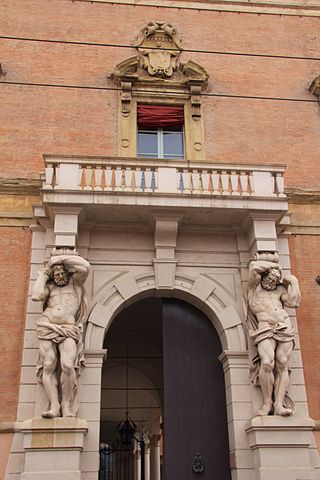
The PalazzoDavìaBargellini is a Baroque style palace located on Strada Maggiore in central Bologna, Italy. It presently hosts the Civic Museum of Industrial art and Davìa Bargellini Gallery, which is an eclectic collection of paintings as well as applied arts and functional ornamentation, described as curiosities of the old Bologna. The diverse applied art collection includes ceramics, liturgical robes, keys, ornamental door knobs, marionettes from street theaters, furniture, iron grille work, elaborately carved wooden frame, and a gilded carriage.

Villa Smeraldi is a rural palace, now museum, along the Canale Navile near the town of Bentivoglio in the Province of Bologna, in the region of Emilia-Romagna of Italy. The villa is the host of the Museum of Peasant Farming Culture, which documents the buildings, tools, routines, and daily lives of those involved in rural agriculture from landowner to peasant.

The Palazzo Fantuzzi is a monumental Renaissance style palace located on Via San Vitale number 23 in central Bologna, region of Emilia-Romagna, Italy. The palace is also known as the Palazzo degli Elefanti for its sculpted decoration, and it stands near the church of Santi Vitale e Agricola.
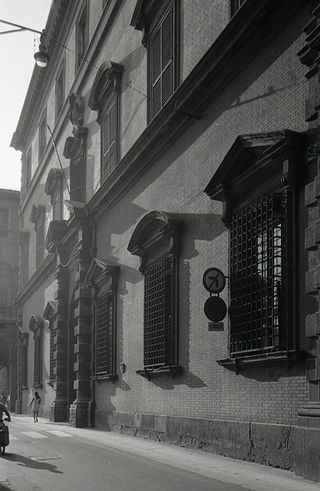
The Palazzo Caprara, also called Palazzo Galliera is a Renaissance-style urban palace located on Via IV Novembre #22 in central Bologna, region of Emilia-Romagna, Italy.
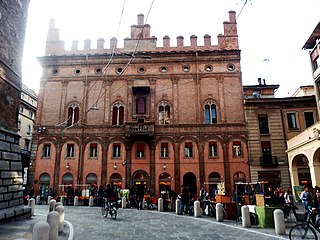
The Palazzo degli Strazzaroli is a Renaissance-style urban palace located at Piazza di Porta Ravegnana #1 in central Bologna, region of Emilia-Romagna, Italy.
The Palazzo Belloni is a palace located on Via de' Gombruti #13 in central Bologna, region of Emilia-Romagna, Italy.

The Palazzo Malvezzi de' Medici is a Renaissance-style palace located on Via Zamboni #13 in central Bologna, Italy. The palace now houses the offices of the Provincial Administration.
Pompeo Zambeccari (1518–1571) was Apostolic Nuncio to Portugal from 1550 to 1553, and served also as Bishop of Valva and Sulmona from 1547 to 1571.
The Palazzo Vizzani Lambertini Sanguinetti, sometimes known merely as Palazzo Vizzani, is a Renaissance palace located on Via Santo Stefano #43 in the center of Bologna, region of Emilia-Romagna, Italy. Presently the palace houses the faculty of Foreign Languages and Literature of the University of Bologna.
















